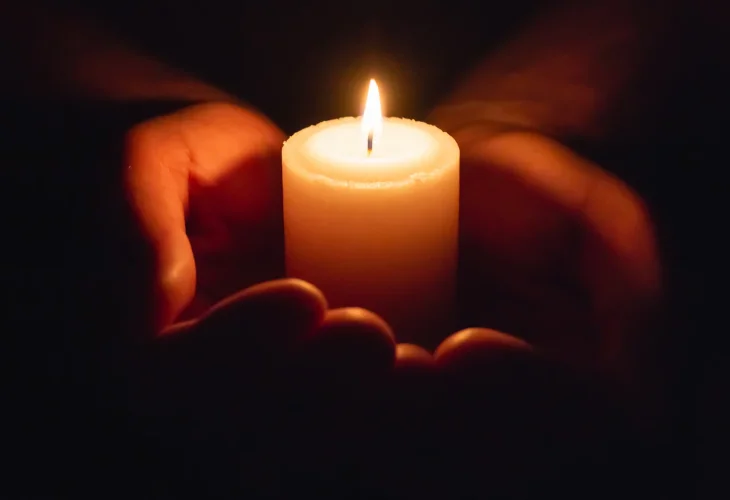5 Heartwarming Tales of Rabbi Simcha Holzberg, 'The Father of the Wounded'
This week marked 29 years since the passing of Rabbi Simcha Holzberg, affectionately known as 'The Father of the Wounded.' Here are 5 touching stories of his compassionate heart and noble deeds.
 (Photo: Shutterstock)
(Photo: Shutterstock)After the Six-Day War, inspired by his mentor Rabbi Aryeh Levin, Rabbi Simcha Holzberg devoted his time to supporting wounded IDF soldiers, the disabled, widows, and orphans, providing them with emotional and financial aid. Rabbi Simcha developed personal connections with wounded soldiers, encouraged them, and was a source of both mental and financial support. In his memory, here are five stories among thousands.
1. In an interview with Arutz 7, his son Ephraim Holzberg shared about the home where his father grew up. "Dad was born in the Warsaw Ghetto to his righteous mother, Zipporah, who would give her pillow to newlywed brides. In a film made about him by Yad Vashem, it is told how as a child he risked his life to do forced labor just to bring home a little bread. Once he managed to smuggle a kilo of cooking chocolate. At the time, hundreds were dying in the streets. He smuggled the chocolate in his work overalls, and his mother, instead of keeping it for a week, broke off a table leg to light a fire, cooked the chocolate in a pot of water, and told him to bring all the hungry children from the building and gave each one a cup of hot chocolate, instead of keeping it for herself, her husband, and her child. This is how he was raised."
2. Ephraim continues to share his father's devotion to wounded IDF soldiers. "When I got married, we came to a Sheva Brachot in my father's sukkah," he recalls. "There was a wounded IDF engineering officer there who had lost all his fingers, had no legs, and was blind, only hearing ten percent in one ear. My father encouraged him to study Jewish law and brought Professor Libai to test him. He had a frightening, raspy voice. My wife saw him and nearly fainted. I said to my father, 'Dad, you know so many wounded people and you choose to bring the most shocking one.' He replied, 'Inviting guests means inviting the one no one wants to invite, not the one that's pleasant to have.'"
3. Another story told by the former Israeli Chief Rabbi Mordechai Eliyahu zt"l: The Ministry of Defense organized a joint Bar Mitzvah event for thirty orphans of war. After the ceremony, the celebrants received gifts from various organizations such as Chabad, the army, the Ministry of Defense, etc. The highlight was a 'Seiko' watch for each Bar Mitzvah boy. However, it turned out there was no watch left for the last young man. The event organizers promised him a similar watch would arrive at his home within a week.
On Rabbi Simcha Holzberg's wrist was a Cartier watch valued at $10,000, a gift from a very wealthy businessman. Rabbi Simcha had been waiting for the right moment to give away this watch, and as his son described, "all those days the watch 'burned' on his wrist."
When Rabbi Simcha saw the child not receiving a watch like the others and being promised a replacement in a week, he whispered to Rabbi Mordechai Eliyahu, feeling that surely in the boy's mind was the thought that if his father hadn't been killed, he wouldn't need a watch or a party. He was concerned about the boy feeling like an orphan or widow being wronged. "He immediately called the boy over, took off his watch, and said, 'I am giving you a watch that is more precious than all the watches here, multiplied by three. Tell your mother to take care of it.'
Ephraim Holzberg sums up the story, noting that "he was so happy to be rid of that watch..."
4. What was his father's secret? "He learned his secret from Rabbi Aryeh Levin: when you love someone, they love you back. So too, when he gave love to the wounded, they returned it. When he spoke with the kibbutz members of Hashomer Hatzair about Greater Israel, they accepted it from him because they knew it came from a loving heart."
5. "His self-sacrifice was on an unprecedented scale," Ephraim shares, giving an example from his childhood: "He was an art dealer and once made a good deal intending to buy an apartment, dividing it between me and my brother. On the way to the mortgage bank, his feet carried him to Tel Hashomer Hospital, where in the old British-era wards, a soldier lay entirely paralyzed. Ceiling plaster was falling on him, and he couldn't move his head. My father was shocked and approached the department manager, saying he had money in his pocket meant for his children, but if he promised the department would be renovated, the money would go to him. He gave him tens of thousands of dollars...
"Dad came home and told us, 'Kinderlach, you don’t know what a mitzvah I did with your money.' We weren't on his level. For us, it was like Tisha B'Av. Later, we understood the greatness of spirit, just like those Rebbes who would give money meant for their children to those in need."
Rabbi Simcha Holzberg passed away unexpectedly on 2 Adar 23 years ago, suffering a heart attack during a memorial for the victims of a terrorist bus attack held at the Glilot Junction. He was laid to rest at the Sanhedria Cemetery, next to his mentor, Rabbi Aryeh Levin.

